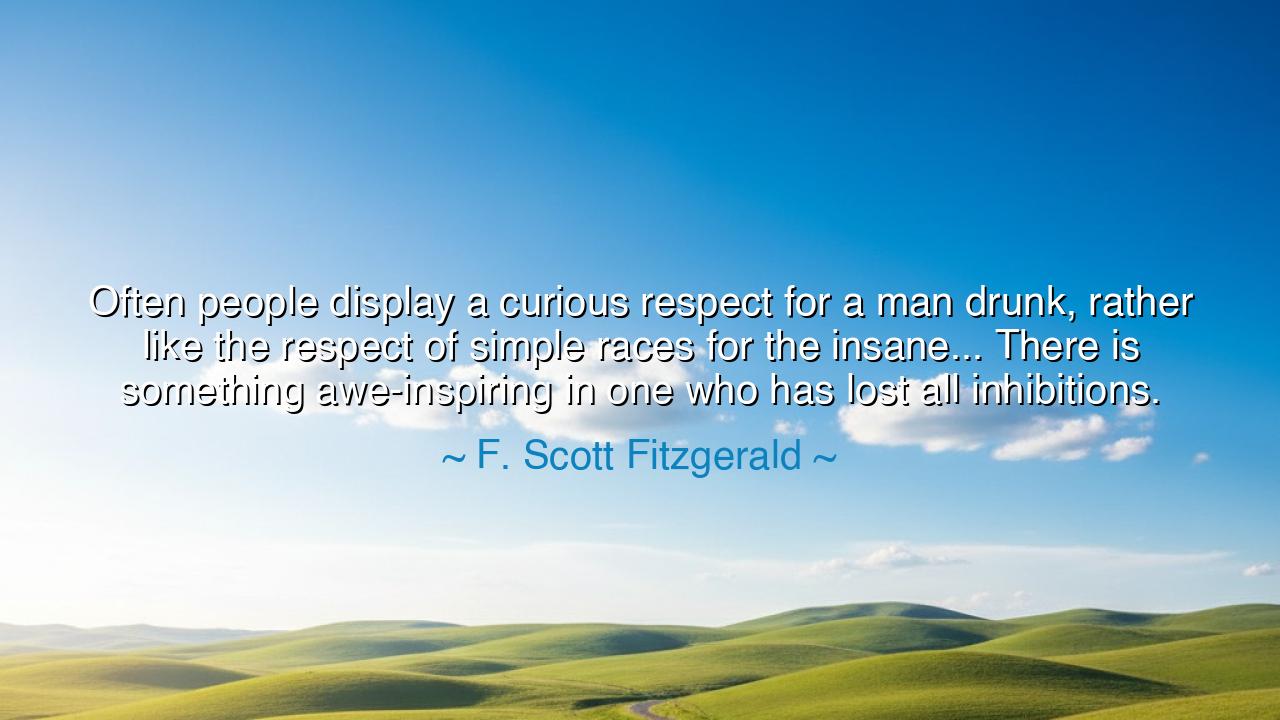
Often people display a curious respect for a man drunk, rather
Often people display a curious respect for a man drunk, rather like the respect of simple races for the insane... There is something awe-inspiring in one who has lost all inhibitions.






In the words of the great F. Scott Fitzgerald, "Often people display a curious respect for a man drunk, rather like the respect of simple races for the insane... There is something awe-inspiring in one who has lost all inhibitions." These words carry a deep reflection on human nature and the mysterious reverence we often have for those who live beyond the confines of societal rules and expectations. It is a curious phenomenon that we often find awe in the unrestrained, the reckless, the untamed, as though there is some hidden power in abandoning one's self-control. Inhibition, that silent guardian of our conduct, is both the strength and the weakness of humanity, and in its absence, we see a glimpse of freedom, though often it is a fleeting and dangerous freedom.
Fitzgerald’s words point to an ancient truth—freedom and chaos are often linked. In many cultures, those who were seen as "mad" or "insane" were viewed with a mix of fear and reverence, as though they had access to some deeper knowledge or truth that others could not comprehend. The shaman, the oracle, the seer—these figures were often regarded as people who had transcended the ordinary boundaries of existence. Their minds, though appearing broken to some, were believed to touch the divine or the unknown. In this sense, the drunkard—who casts off the chains of self-control—is akin to the mad prophet, who sees the world with unclouded vision, or the warrior who, in his frenzy, becomes a vessel of unstoppable power. In losing their inhibitions, they gain a certain freedom, a raw power that others both fear and admire.
But this respect that Fitzgerald speaks of is a paradox. It is not a genuine admiration but an uneasy reverence for the untamed spirit, the one who is no longer shackled by the rules of civilized behavior. The drunkard may be pitied, even despised, but there is an undeniable awe that his wildness evokes. In many ancient societies, the line between the sane and the insane, the rational and the irrational, was not as sharp as it is in the modern world. The madman or the drunkard was both feared and revered, for they were perceived to walk between the worlds, unbound by the constraints that governed the lives of ordinary men. This awe is not born of respect for the individual’s character, but rather for the freedom they embody—the freedom to cast off society’s expectations, to live without fear of judgment or consequence.
This respect for the unrestrained mind can be traced back to ancient cultures. In Greece, the followers of Dionysus, the god of wine and ecstasy, revered the drunken madness as a form of spiritual liberation. Dionysian revelers were believed to be touched by the god himself, free from the rules of society and bound only by their wild passions. Their wildness, their abandonment of inhibition, was seen as a means of transcending the ordinary experience of life and touching something divine. Though their actions may have been reckless, even dangerous, there was a deep respect for the energy they unleashed. Similarly, in some Native American traditions, the visionary experiences induced by intoxicants or trance states were held in high regard, for it was believed that those who had lost themselves to these states could perceive truths hidden from the rest of humanity.
Fitzgerald’s words, then, reflect a universal truth about human psychology. Inhibition, though a necessary part of civilized existence, also acts as a prison. The individual who casts it aside becomes both a figure of fear and admiration, for they remind us of what it would be like to live without restraint, to act without consequence. But this freedom comes at a cost. It is the freedom of chaos, of disorder, and often leads to self-destruction. The drunkard, like the madman, may walk boldly through the world, but the ground beneath his feet is often crumbling. It is the wild, unrestrained soul that evokes the most mysterious form of respect, for it touches something within us all: the desire to break free, to live without the chains that bind us.
In the end, Fitzgerald teaches us an essential lesson: freedom and restraint are both sides of the same coin. The drunkard, the one who has lost all inhibition, becomes a figure of awe not because he is virtuous or wise, but because he embodies the raw power of freedom—the freedom to be without constraint, without care. But it is a fleeting freedom, one that comes at the cost of self-destruction. The lesson here is to recognize that while we may find respect for the unrestrained, we must not forget that the path to true freedom lies not in casting off all inhibition, but in knowing when to restrain ourselves and when to let go. True power lies in the balance between the two.
Therefore, let us reflect on these words with both understanding and caution. We must respect the freedom of the untamed soul, but also remember the danger that comes with the loss of self-control. Inhibition is not the enemy of the spirit, but its guide. To live without it is to embrace chaos, but to live with it is to live within the structure of wisdom. Let us strive for a life where we can embrace freedom without losing ourselves to it, and where we can respect the untamed spirit while knowing its limits.






AAdministratorAdministrator
Welcome, honored guests. Please leave a comment, we will respond soon